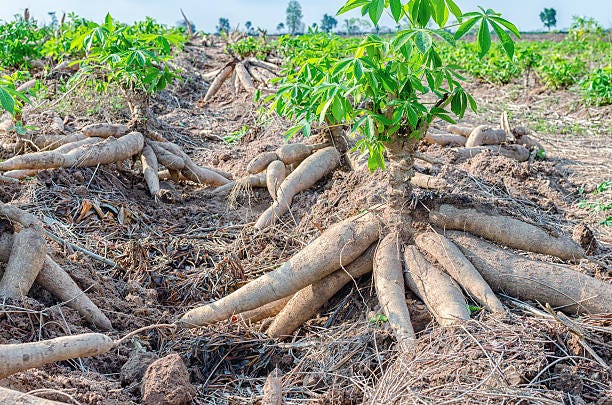- This topic is empty.
- AuthorPosts
- April 14, 2025 at 5:55 am #626465

Cassava is known for its hardiness and ability to grow in marginal soils, making it a staple crop in many tropical regions.
However, continuous cultivation without proper land management can lead to soil degradation, reduced yields, and long-term declines in farm productivity.
To ensure the crop’s sustainability and contribution to food security, farmers must adopt sustainable cassava farming practices for soil health and productivity. These practices not only protect the environment but also improve crop performance and support resilient farming systems.
1. Implementing Crop Rotation And Intercropping Systems
Rotating cassava with legumes or other nutrient-enhancing crops is essential for maintaining soil fertility. Legumes, such as cowpeas or groundnuts, naturally fix nitrogen in the soil, enriching it for subsequent cassava crops.
Intercropping cassava with compatible crops like maize or beans also helps reduce weed pressure, improve land use efficiency, and lower pest incidence. These diversified planting systems break disease cycles and contribute to a more balanced and biologically active soil.
2. Applying Organic Amendments And Mulching Techniques
Soil organic matter plays a vital role in nutrient retention, water holding capacity, and microbial activity. Using compost, farmyard manure, and crop residues as organic amendments replenishes nutrients and boosts soil structure.
Mulching with plant materials helps conserve moisture, suppress weeds, and prevent erosion. These low-cost, accessible methods enhance long-term soil health and create a more favorable environment for cassava root development and yield stability.
3. Reducing Soil Erosion Through Contour Farming And Cover Crops
Erosion is a major threat in cassava fields, especially on sloped or bare lands. Sustainable practices like contour farming—planting along natural land contours—help slow water runoff and prevent soil displacement.
Establishing cover crops such as mucuna or pigeon pea between growing seasons protects the soil surface and adds biomass to the soil. These erosion-control measures preserve topsoil and promote healthier root systems, which are critical for cassava’s productivity.
4. Balancing Nutrient Management With Soil Testing
Sustainable cassava farming practices for soil health and productivity must be guided by informed nutrient management. Regular soil testing helps determine specific nutrient needs and prevents the overuse of fertilizers, which can degrade soil quality over time.
Based on test results, farmers can apply the right type and amount of fertilizer—whether organic or inorganic—tailored to their soil’s condition. This balanced approach maximizes cassava yield while protecting soil ecosystems from nutrient imbalances.
5. Promoting Farmer Education And Climate-Smart Practices
Building farmer capacity through training and extension services ensures that sustainable soil practices are understood and adopted. Programs that teach conservation agriculture, integrated soil fertility management, and climate-smart techniques empower farmers to make decisions that sustain productivity over time.
These include using drought-tolerant cassava varieties, managing planting times effectively, and adopting resilient land management strategies.
Educated farmers are more likely to embrace innovation and protect the natural resources their livelihoods depend on.
Adopting sustainable cassava farming practices for soil health and productivity is essential for ensuring the long-term viability of cassava as a food and income crop. Through crop rotation, organic amendments, erosion control, and informed nutrient management, farmers can preserve the health of their land while boosting yields.
These practices not only enhance the resilience of cassava systems but also contribute to broader environmental and economic sustainability. Healthy soil is the foundation of productive farming—and the key to a secure future for cassava growers worldwide.
Read Also: Sustainable Cassava Farming Practices for Increased Yield and Soil Health
- AuthorPosts
- You must be logged in to reply to this topic.






